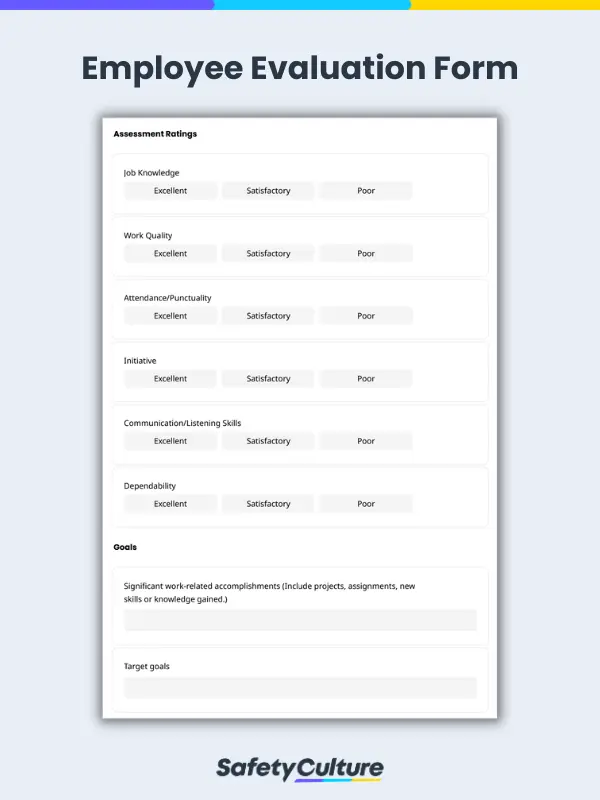What is an Employee Evaluation?
An employee evaluation is the process of assessing an employee’s level of performance and attitude towards performing tasks and with colleagues in the workplace. Employee evaluations are conducted to help employers determine if employees are still aligned with the expectations of the organization and if the organization, as a whole, is working towards its goals.
What are Employee Evaluation Forms?
Employee evaluation forms are tools used by managers, HR teams, and employees themselves to record employee performance, accomplishments, and areas for improvement. They are an important tool in any organization’s performance management system that aims to monitor its progress and they are designed to:
- Align expectations between employers and employees of the job’s requirements;
- Assist with developmental training plans; and
- Serve as a documented employee interaction to support key HR decisions.
What are the Types and Importance of Employee Evaluation Forms?
An effective employee evaluation should include 360 degree feedback from leaders, peers, and the individual employee. Employee evaluation forms can cover the following:
- Top-down evaluations – performed by an immediate supervisor with a focus on productivity, objectives, behavior, and values; A top-down employee evaluation provides the perspective of management and serves as an avenue where the leadership’s expectations and the actual employee performance can work together to align. It’s an opportunity for both leaders and their direct reports to know where they are currently on set goals, the expected level of performance, and type of work attitude.
- Peer evaluations – performed by co-workers to assess skills, quality of work, and teamwork; Conducting peer evaluations as a method of employee assessment helps the organization determine how culture-fit is an employee in a particular team or department and observe the dynamics between employees, such those between more tenured or more experienced employees and the new hires. It helps provide a different perspective or a better insight into employees that managers may not be able to observe in their absence.
- Self-assessments – self-critique on strengths, areas of improvement, and goals. Self-assessments give employees the opportunity to provide their own perspective on how they performed, what they think they need help with, and how else they can contribute to the company. It helps managers realize how they can better equip their direct reports to perform better, stay aligned with company directives, and reach career goals.
How to Conduct Employee Evaluations?
Employee evaluations may be conducted in different ways and frequency depending on the nature of work, department, or industry standards and regulations. Here are tips on how to conduct employee evaluations:
Be prepared
- Look at past notes and records of performance and prepare these for the assessment. Remember how the employee performed during the duration that the employee is being assessed for.
- More than preparing goals for the employee, work with the employee to set goals that are Specific, Measurable, Achievable, Realistic, and Time-bound (S.M.A.R.T.).
Be aware of timelines
- Employee evaluations, ideally, take timelines into account—past, present, and future—with employee reviews conducted and employee goals built based on events and performances at certain times.
- Employee evaluations are scheduled and should not come as a surprise when employees are to be evaluated.
Be able to take notes
- Always maintain records of employee performance and past assessments. An employee evaluation based on factual data backed by records can help the employer and employee conduct an evaluation that is objective and fair.
The Problem: Paper Performance Evaluation Forms
Paper-based employee evaluation forms can be time-consuming to complete, requires duplicative work, and unproductive scanning of signed documents. Paper trails are hard to track and recover
and are at a high risk of getting lost.
Important management decisions that impact employees such as promotions, pay hike, remediation, or dismissal rely on signed evidence of timely employee evaluations. Losing track of these documents can put your organization and brand at risk and lead to disgruntled employees.



